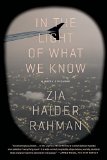Summary | Excerpt | Reviews | Beyond the Book | Readalikes | Genres & Themes | Author Bio

Critics' Opinion:
Readers' Opinion:
First Published:
Apr 2014, 512 pages
Paperback:
Feb 2015, 512 pages
 Book Reviewed by:
Book Reviewed by:
Poornima Apte
Buy This Book
1
Arrival or Wrong Beginnings
Exile is strangely compelling to think about but terrible to experience. It is the unhealable rift forced between a human being and a native place, between the self and its true home: its essential sadness can never be surmounted. And while it is true that literature and history contain heroic, romantic, glorious, even triumphant episodes in an exile's life, these are no more than efforts meant to overcome the crippling sorrow of estrangement. The achievements of exile are permanently undermined by the loss of something left behind forever.
—Edward W. Said, "Reflections on Exile"
Now when I was a little chap I had a passion for maps. I would look for hours at South America, or Africa, or Australia, and lose myself in all the glories of exploration. At that time there were many blank spaces on the earth, and when I saw one that looked particularly inviting on a map (but they all look like that) I would put my finger on it and say, "When I grow up I will go there."
—Joseph Conrad, Heart of Darkness
It is not down in any map; true places never are.
—Herman Melville, Moby-Dick
In the early hours of one September morning in 2008, there appeared on the doorstep of our home in South Kensington a brown-skinned man, haggard and gaunt, the ridges of his cheekbones set above an unkempt beard. He was in his late forties or early fifties, I thought, and stood at six foot or so, about an inch shorter than me. He wore a Berghaus jacket whose Velcro straps hung about unclasped and whose sleeves stopped short of his wrists, revealing a strip of paler skin above his right hand where he might once have worn a watch. His weathered hiking boots were fastened with unmatching laces, and from the bulging pockets of his cargo pants, the edges of unidentifiable objects peeked out. He wore a small backpack, and a canvas duffel bag rested on one end against the doorway.
The man appeared to be in a state of some agitation, speaking, as he was, not incoherently but with a strident earnestness and evidently without regard for introductions, as if he were resuming a broken conversation. Moments passed without my interruption as I struggled to place something in his aspect that seemed familiar, but what seized me suddenly was a German name I had not heard in nearly two decades.
At the time, the details of those moments did not impress themselves individually upon my consciousness; only later, when I started to put things down on paper, did they give themselves up to the effort of recollection. My professional life has been spent in finance, a business concerned with fine points, such as the small movement in exchange rates on which the fate of millions of dollars or pounds or yen could hang. But I think it is fair to say that whatever professional success I have had—whatever professional success I had—owes less to an eye for detail, which is common enough in the financial sector, than it does to a grasp of the broad picture in which wide patterns emerge and altogether new business opportunities become visible. Yet in taking on the task of reporting my conversations with Zafar, of collating and presenting all the material he provided, including volumes of rich and extensive notebooks, and of following up with my own research where necessary, it is the matter of representing details that has most occupied me, the details, to be precise, of his story, which is—to risk putting it in such dramatic terms as Zafar would deprecate—the story of the breaking of nations, war in the twenty-first century, marriage into the English aristocracy, and the mathematics of love.
* * *
I had not heard the name of the twentieth-century Austrian American mathematician Kurt Gödel since a July weekend in New York, in the early 1990s, when I was visiting from London for a month of induction at the head offices of an investment bank into which I had recently been recruited. In some part I owe my recruitment to the firm, of which I later became a partner, to Zafar, who was already a derivatives trader in the bank's Wall Street offices and who had quickly established a reputation as a bright though erratic financial wizard.
Excerpted from In the Light of What We Know by Zia Haider Rahman. Copyright © 2014 by Zia Haider Rahman. Excerpted by permission of Farrar, Straus & Giroux. All rights reserved. No part of this excerpt may be reproduced or reprinted without permission in writing from the publisher.





The Flower Sisters
by Michelle Collins Anderson
From the new Fannie Flagg of the Ozarks, a richly-woven story of family, forgiveness, and reinvention.

The House on Biscayne Bay
by Chanel Cleeton
As death stalks a gothic mansion in Miami, the lives of two women intertwine as the past and present collide.

The Funeral Cryer by Wenyan Lu
Debut novelist Wenyan Lu brings us this witty yet profound story about one woman's midlife reawakening in contemporary rural China.
Your guide toexceptional books
BookBrowse seeks out and recommends the best in contemporary fiction and nonfiction—books that not only engage and entertain but also deepen our understanding of ourselves and the world around us.